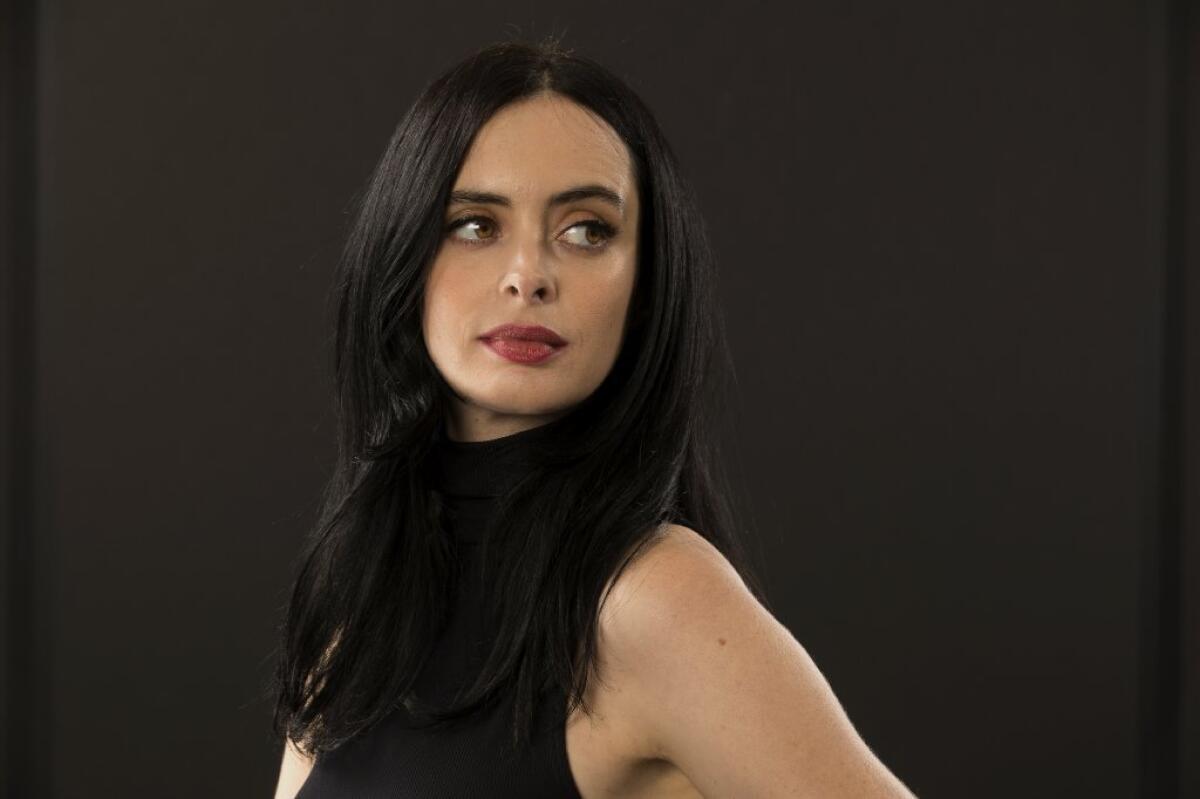For Krysten Ritter, playing Jessica Jones is all in the back story — and the stunts

When Krysten Ritter signed on as the titular character in Netflix’s noir drama “Marvel’s Jessica Jones,” she was drawn to the idea of the series as a psychological character study. Crashing into street signs would come later.
Unlike most Marvel screen properties, the drama relies almost entirely on practical effects. “I had a lot of fun doing the stunts,” Ritter said recently in a chat with The Envelope. But the wire work took a little getting used to. “My first time, I swung into a street sign,” the actress admits.
The 13-episode first season of the drama about a troubled superhero-turned-private detective was an instant critical favorite upon its release last fall. It has been renewed for a second season — though it will be awhile before those episodes hit the streaming service. Production has been held off to make time for “The Defenders,” the “Avengers”-esque miniseries that brings together the Marvel-Netflix heroes Daredevil, Jessica Jones, Luke Cage and Iron Fist.
So is it sort of surreal to be a Marvel hero?
The whole thing is just more than I could have ever imagined. Getting this part completely changed my life. It changed where I live and it changed the amount of promotion, the shooting. It’s changed everything.

Watch Krysten Ritter talk about her role as the trash-talking, tough-as-nails heroine at the center of Netflix’s “Jessica Jones.”
It must have been a lot to get into Jessica that we don’t see on screen, to create that back story for her, and to live in those emotions?
That’s the exciting part for an actor. So getting a character with this incredibly rich back story — everything she does is informed by this back story — is really exciting, because I always knew where I was coming from. But it definitely takes a toll because I’m more bubbly and alive and zestful and I like to have a good time. So after a while, you’re like, “Oh my God, I’m getting really depressed.” And I just had to move across the country, so I’m in an apartment that doesn’t have my furniture. I’m not around my friends. I spent a lot of time walking around doing the scenes by myself in my apartment. All of that helped me find Jessica’s loneliness.
Did you do a lot of talking with series creator Melissa Rosenberg about who she was?
Melissa and I have had a very open dialogue from the beginning. We also have a great director, S.J. Clarkson, who I always felt like was in it with me. She was the constant. I do have a lot of scenes where I’m all by myself, and so I would turn to her afterward and she would be the person I connected with.
Were you surprised that Melissa killed off Kilgrave?
Around Episode 12, before I got the finale, I was like, she’s got to, she’s got to kill him. After Hope died, everything kind of shifted. For me, playing her, at the moment when Jessica kills him, she’s very conflicted because he was her purpose. It’s a little bit of a Stockholm syndrome thing. She’s almost become codependent on that relationship, but he’s just been so awful, and Jessica needs to kill him to get to that next step. I don’t know where she goes next emotionally, but I know in the moment when we were playing that scene, it was very difficult for me.
So it was definitely draining and difficult, but it was really important to me to give this -- her PTSD and then this back story -- a lot of integrity.
— Krysten Ritter
How was it playing those scenes in general when you’re held captive?
Exhausting. You do those scenes and even when you’re just there listening, you want to make sure you’re very alive. The way PTSD works is you are reliving that moment, so I was doing that as much as I could. So it was definitely draining and difficult, but it was really important to me to give this — her PTSD and then this back story — a lot of integrity.
This is all leading up to “The Defenders.” How do you think that’s going to play out for you? Are you ready to be part of a mishmash of characters?
I’m really looking forward to it. I think Marvel is proving just over and over again that the quality is so high. I mean, I don’t know how Jessica fits into that world. I think we kind of all feel that way. Like, how do we all get together? How does that work? But I’m excited to see what they come up with.
MORE:
Watch: We interview Krysten Ritter of Netflix’s ‘Jessica Jones’ on Facebook
‘Smile!’ How a villain’s phrase in ‘Jessica Jones’ exposes modern-day sexism
yvonne.villareal@latimes.com
@yvillareally
More to Read
From the Oscars to the Emmys.
Get the Envelope newsletter for exclusive awards season coverage, behind-the-scenes stories from the Envelope podcast and columnist Glenn Whipp’s must-read analysis.
You may occasionally receive promotional content from the Los Angeles Times.











